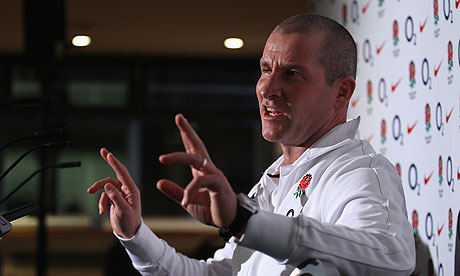
The rebuilding has begun. The first blocks were laid on Thursday, under the cover of the Varsity Match, and England now have a coaching team for the Six Nations: Stuart Lancaster, Graham Rowntree and Andy Farrell. They wore white at their unveiling, confessed to inexperience, but promised passion and energy. It was as if a shaft of light had penetrated the bunker.
The new team have time to plan the selection of their squad for the Six Nations. Or at least they can enjoy their Christmas before revealing just how radical they are prepared to be as caretakers. With no promise of work beyond March, they could play safe and stick with an experienced England squad, a group so full of remorse and guilt after their failings at the World Cup that they would seize their chance at redemption. Wouldn't they?
This line may be tempting given the sticky twist to the fixture list. England are on the road in the first two rounds of the Six Nations, at Murrayfield and in Rome, neither a good place to go with experimentation on your mind. Any revolution must have self‑belief at its core and that only comes with winning.
On the other hand, Lancaster has to change the way England play. Gone are the days when their pack could set the pace and slow everyone down to their speed, squeezing the life out of inferior models up front. The gym has done its work and forwards are universally bulked up. The secret now is to shift them dynamically around the park.
Much as Nick Easter is starting to regather his own kicks in the ranks of Harlequins, it would probably be one of the more taxing requests a coach could make: Nick, will you declare himself sold on the notion of gambolling over the sword of Murrayfield? We see you as our aerobically honed stayer.
The other option for the fill-in coaches is to start afresh on all fronts. Why should they worry about continuity? England were rubbish at the World Cup; the coaches are here for five matches; why not rip up the manual and start all over again? Out with the old and in with the new – at least they know them through the Saxons. It is said so often that it has become a given: England have so much talent coming through …
The truth is, nobody yet knows how good the new generation will be. They look good in their respective age groups and they have settled into Premiership teams, but playing at full international level against top-tier teams is a light-year away from what any uncapped England player knows about his sport. Throw them in en masse and you risk destroying their careers. A mass culling of talent.
Lancaster spoke such good sense that he will not be carried away. As soon as the old Cumbrian hill farmer in him came out – all that hefting – you knew that graft might win an argument with dreaminess. It will take time to up the tempo and that is what he does not have, being only an interim coach.
It means the position is a little more precarious than the win-win spin imparted to it at first implied. Make England successful and you are in with a shout of an extension; lose and you put it down to unexpected experience gained at an early stage of your coaching career. It may be a little more difficult than that, with progress coming in small steps and likely to be invisible, even undone when a new regime arrives.
The most important early choice for the new coaching team is their captain. It became the currency before the World Cup that the captain was not a particularly important position. But you only had to see the influence of Richie McCaw, Thierry Dusautoir, Brian O'Driscoll, Felipe Contepomi, Sam Warburton, Sergio Parisse and James Horwill to recognise the importance of the leader. John Smit worked wonders down the years for South Africa. The captain sets the tone, hushes the facetious comments, sells the pain ahead of revamped fitness schedules as an attraction.
The sending-off of Tom Wood against Leicester should not count against him. Warburton hardly suffered as a victim of red-card justice. Wood of Northampton or Chris Robshaw of Harlequins, both from the back row, which will be the very core of the new up-tempo revolution.
The easy bit for new England is that nobody will be making too many unfavourable comparisons with old England. The slate is well and truly wiped clean and the coaches have rather cleverly been given a chance to shine, and no harm done if it doesn't quite work out for them. I'm not sure rugby at this level is meant to work like that, but we should at least acknowledge the fresh approach. Deep into the mountain of rubble a little light shines.

